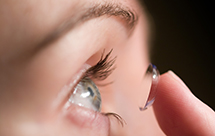Optical
Comprehensive Eye Examination
FAQ
My eyes don't hurt and my vision is okay. Why should I have an eye exam?
Regular eye exams are an invaluable tool in maintaining your eyes health by detecting and preventing disease. Some diseases, such as glaucoma, often develop gradually without causing pain or vision loss – so you may not notice anything wrong until significant and irreversible damage has been done. Early detection of any problems can allow for a choice of treatment options and a reduced risk of further harm.
 A regularly scheduled Comprehensive Eye Exam, Patients should see their doctor for a comprehensive eye exam every year. Children should have regular tests to ensure the proper development of their vision and prevent any interference with academic achievements. Older adults are often at a higher risk for eye conditions such as glaucoma, macular degeneration and cataracts. Even if eyes are healthy, a regular eye exam will provide the doctor with an ability to view the blood vessels of the eye. With information obtained during an examination of the eyes, physicians have been able to detect chronic conditions such as high cholesterol, diabetes and high blood pressure. The early detection of these conditions can lead to early treatment.
A regularly scheduled Comprehensive Eye Exam, Patients should see their doctor for a comprehensive eye exam every year. Children should have regular tests to ensure the proper development of their vision and prevent any interference with academic achievements. Older adults are often at a higher risk for eye conditions such as glaucoma, macular degeneration and cataracts. Even if eyes are healthy, a regular eye exam will provide the doctor with an ability to view the blood vessels of the eye. With information obtained during an examination of the eyes, physicians have been able to detect chronic conditions such as high cholesterol, diabetes and high blood pressure. The early detection of these conditions can lead to early treatment.
Contact Lenses
Over 35 million Americans wear contact lenses, according to the American Optometric Association. Unlike glasses, contact lenses move with your eyes so you can enjoy a larger field of vision with fewer distortions. You also don't have to deal with frames hovering in your peripheral vision or external lenses that fog up on cold days or get wet in the rain.
There are many different kinds of contacts, including:
- Rigid gas permeable
- Extended wear
- Disposable wear
- Daily-wear
- Bifocal or multifocal
After a thorough eye exam and consultation with an experienced physician, patients who qualify for contact lenses can discuss which type of contact lens is right for them. All contact lenses require special care and cleaning. You'll need to make regular follow-up visits to ensure your eyes remain healthy.
Eyeglasses
Over 150 million people in the United States wear eyeglasses. Glasses improve vision by adjusting the way the eyes bend and focus light. Ideally, light rays are refracted, or bent, as they pass through the cornea so that the image can be focused on the retina, in the back of the eye. In a healthy eye, this means that objects can be seen clearly. Many people have a cornea that has either a shallow or steep curvature that causes light rays to focus either in front of or behind the retina. Objects may appear blurry at certain distances or at all distances.
Glasses correct these refractive errors. Prescriptions for each eye are measured for optimal vision clarity, usually 20/20. Eyewear may be used for certain activities, such as reading for farsighted, or hyperopic patients and driving or watching television for nearsighted, or myopic patients. Eyeglasses may need to be worn at all times.
Regular eye exams test for the development and progression of refractive errors and help your doctor provide a proper prescription if eyeglasses are needed. Exams are also an invaluable tool in the early detection of eye disease.
Types of Eyeglass Lenses
Bifocal eyeglass lenses contain two lens powers. prescriptions (distance-viewing at the top of the lens and near-viewing at the bottom) with a sharp separation in the middle.
Trifocal eyeglass lenses contain three lens powers.
Multifocal eyeglass lenses contain two or more lens powers.
![]() For more information about Optical, or to schedule an appointment, please feel free to complete our online form or call 407-644-4477.
For more information about Optical, or to schedule an appointment, please feel free to complete our online form or call 407-644-4477.
